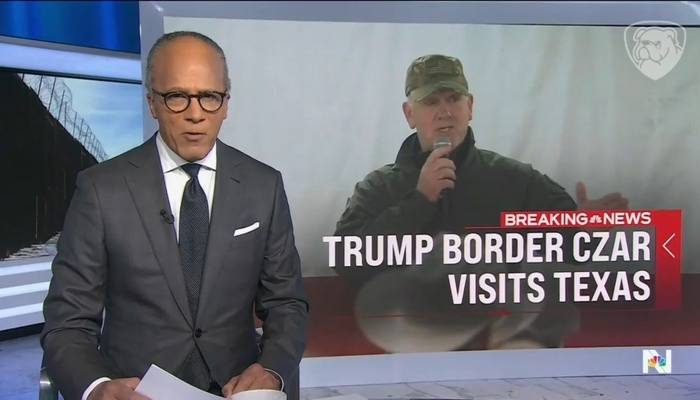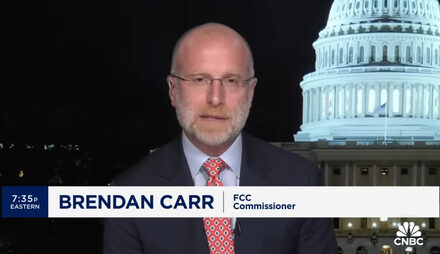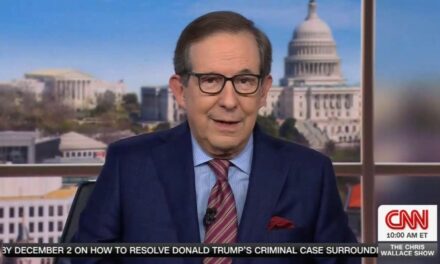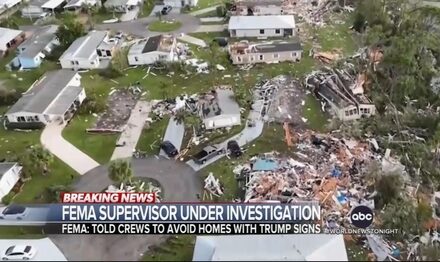We support our Publishers and Content Creators. You can view this story on their website by CLICKING HERE.

Incoming Border Czar Tom Homan made a visit to the Texas part of the U.S. southern border. Under normal circumstances, this would warrant across-the-board coverage from the “mainstream media”, given how much of a departure Homan’s visit is from border enforcement. But the CBS Evening News found zero time for the new Border Czar.
NBC was the only network newscast to do a standalone report on Homan’s border visit, here’s how it opened:
NBC NIGHTLY NEWS
11/26/24
6:40 PM
LESTER HOLT: Now to a visit to Texas today by President-Elect Donald Trump’s new border czar, saying he is preparing to carry through on Trump’s plan for mass deportations, and warning Democrats who might be willing to block the deportation efforts, “don’t test us.” Gabe Gutierrez now with late details.
GABE GUTIERREZ: Today, President-Elect Donald Trump’s border czar in Texas, saying he is ready to carry out Trump’s campaign pledge to secure the border and deport undocumented immigrants, starting with criminals.
TOM HOMAN: Let me be clear. There is going to be a mass deportation. Because we just finished a mass illegal immigration crisis on the border.
GUTIERREZ: After more than 10 million illegal border crossings in the last four years, Tom Homan says he plans to take the handcuffs off Immigration and Customs Enforcement, known as ICE.
After the Homan portion of the report showcased above, Gutierrez covered what the return of the Safe Communities program means for local law enforcement, and interviewed Patty Morin, the mother of Rachel, the mother of 5 who was brutally murdered by an illegal alien who skipped murder charges in his home country in order to migrate to the U.S.
Gutierrez’ report closed out with a focus on local authorities who may feel inclined to resist local enforcement of immigration law, such as the mayor of Minneapolis, who backed off his earlier statements.
Whereas NBC did a full report related to immigration enforcement, ABC included Homan’s border visit to their report on President Elect Donald Trump’s new tariffs proposal:
TERRY MORAN: Today in Texas, Trump’s incoming border czar Tom Homan was laying the groundwork for mass deportations.
TOM HOMAN: Let me be clear. There is going to be a mass deportation. Because we just finished a mass illegal immigration crisis on the border.
MORAN: And Homan warned local officials and ordinary citizens not to stand in the way.
HOMAN: We’re a nation of laws, and we’re going to enforce those laws. And I’m sending a message to the people who said they’re going to get in our way, they’re going to stop us from doing what we’re doing- interior enforcement operations, I’ve said it 100 times in the last week, don’t cross that line.
This, of course, is infinitely more time than CBS devoted to the border. With that omission: a periodic reminder that covering one’s eyes and refusing to report things doesn’t mean that those things didn’t happen. The border happened over the last four years, and so will its counter correction over the next four.
Click “expand” to view the full transcripts of the aforementioned reports as aired on their respective evening newscasts:
NBC NIGHTLY NEWS
11/26/24
6:40 PM
LESTER HOLT: Now to a visit to Texas today by President-Elect Donald Trump’s new border czar, saying he is preparing to carry through on Trump’s plan for mass deportations, and warning Democrats who might be willing to block the deportation efforts, “don’t test us.” Gabe Gutierrez now with late details.
GABE GUTIERREZ: Today, President-Elect Donald Trump’s border czar in Texas, saying he is ready to carry out Trump’s campaign pledge to secure the border and deport undocumented immigrants, starting with criminals.
TOM HOMAN: Let me be clear. There is going to be a mass deportation. Because we just finished a mass illegal immigration crisis on the border.
GUTIERREZ: After more than 10 million illegal border crossings in the last four years, Tom Homan says he plans to take the handcuffs off Immigration and Customs Enforcement, known as ICE. But a major question is how he will get the manpower to do it.
GUTIERREZ: Do you believe that local authorities should help enforce federal immigration laws?
JEFFREY GAYLOR: Oh, absolutely. I think we have to.
GUTIERREZ: Jeffrey Gaylor is the sheriff of Hartford County, Maryland, one of dozens across 21 states that are part of ICE’s 287[G] program which allows the feds to delegate specialized immigration functions to state and local law enforcement.
GAYLOR: This is not stopping people on the street, saying “show me your papers.” They’re brought in, they’re arrested for something that they have committed, that they have committed against the citizens of our community. And at that point, they are held accountable for the actions of being in the country illegally.
GUTIERREZ: One of his deputies showed us how the program is run out of the county jail, where trained corrections officers can look through ICE’s database and detain suspects arrested for other crimes for up to 48 hours if ICE wants to pick them up to deport them.
Do you anticipate this program ramping up potentially in this next administration?
DEPUTY SHERIFF: I believe so. I believe we’re going to be very busy.
GUTIERREZ: The Immigration debate exploding in this county.
PATTY MORIN: I was angry. I was actually very angry.
GUTIERREZ: Where Patty Morin’s 37-year-old daughter Rachel, a mother of five, was murdered last year, police say, by an undocumented immigrant who was released into the U.S.
MORIN: I want people to be protected. That’s all. I don’t want any more life lost.
GUTIERREZ: Still, migrant advocates say that 287[G] program gives local police an unlawful excuse to help deport people.
This hurts those families. This leads to the worst public safety outcomes. It erodes the sense of trust in communities and hurts the economy.
GUTIERREZ: Does this amount to racial profiling?
GAYLOR: No, not at all. Again, it’s- everybody is screened.
GUTIERREZ: Some Democrats now vowing to resist Trump’s deportation plan.
MICHELLE LUJAN GRISHAM: We are not going to cooperate in any way in that effort.
GUTIERREZ: Denver’s mayor threatened to post local police at the county line to block federal immigration officers, then backtracked.
MIKE JOHNSTON: We have no plan to do that and we really hope that we don’t ever have to do that.
GUTIERREZ: Trump’s new border czar with this response tonight.
HOMAN: Don’t test us. The nation wants a safe country.
GUTIERREZ: Trump allies tell NBC News the President-Elect is expected to sign up to five executive orders aimed dealing with immigration. Lester.
HOLT: Gabe Gutierrez at The White House. Thanks.
ABC WORLD NEWS TONIGHT
11/26/24
6:39 PM
DAVID MUIR: Now, to the economy tonight, and President-Elect Trump says he will impose 25% tariffs on Day One against our neighbors Canada and Mexico. Tonight, Mexico says it will slap a tariff on U.S. goods in exchange. Trump pointing to the border, fentanyl, and illegal immigration. But tonight, this question here — who pays for these tariffs? U.S. companies bringing the products into the U.S. pay the tariff at first, and then sell those products to U.S. shoppers. So will those costs be passed onto consumers? Here’s Terry Moran tonight.
TERRY MORAN: In a statement that rattled markets worldwide, President-Elect Donald Trump declared that on Day One of his new administration, he will impose the most sweeping tariffs in recent history, targeting America’s nearest neighbors and biggest trading partners. “I will sign all necessary documents to charge Mexico and Canada a 25% tariff on all products coming into the United States, and its ridiculous open borders,” Trump posted on social media. “This tariff will remain in effect until such time as drugs, in particular fentanyl, and all illegal aliens stop this invasion of our country.” It’s the fulfillment of a campaign pledge.
DONALD TRUMP: And I’m putting tariffs on Mexico, every damn thing that they sell into the United States has got to have like a 25% tariff until they stop drugs from coming in.
MORAN: The United States does more than $1 trillion in trade with Canada and Mexico every year. From consumer electronics to cars and trucks, to fresh fruit and vegetables. Trump’s new tariffs would not be paid by Canada and Mexico, but by U.S. companies and stores, who will pass on much of the cost to consumers by raising prices on their products. Best Buy and Walmart already warning today new tariffs will mean higher price tags. Reaction to Trump’s announcement was swift. Mexico’s president Claudia Sheinbaum threatening to impose retaliatory tariffs on American goods.
CLAUDIA SHEINBAUM (IN SPANISH): One tariff will be met with another tariff in response.
MORAN: Saying the border crisis cannot be solved “With threats and tariffs,” warning that if the U.S. imposes tariffs, “It is not acceptable and would cause inflation and job losses in the U.S. and Mexico.” Canada’s Prime Minister Justin Trudeau took a softer line, saying he spoke to Trump.
JUSTIN TRUDEAU: This is a relationship that we know takes a certain amount of working on, and that’s what we’ll do.
MORAN: Trump is using these tariffs to pressure Canada and Mexico to help him deliver on his key campaign promise — securing the border. Today in Texas, Trump’s incoming border czar Tom Homan was laying the groundwork for mass deportations.
TOM HOMAN: Let me be clear. There is going to be a mass deportation. Because we just finished a mass illegal immigration crisis on the border.
MORAN: And Homan warned local officials and ordinary citizens not to stand in the way.
HOMAN: We’re a nation of laws, and we’re going to enforce those laws. And I’m sending a message to the people who said they’re going to get in our way, they’re going to stop us from doing what we’re doing- interior enforcement operations, I’ve said it 100 times in the last week, don’t cross that line.
MORAN: Trump also declared in a separate social media post that he will slap a 10% tariff on all imports from China, until Beijing stops the flow of illegal fentanyl into the U.S. And, again, though Trump says China will pay those tariffs directly to the U.S. Treasury, that’s not how it works. U.S. Importers and companies pay those tariffs and they pass the costs on mostly to consumers through higher prices. David?
MUIR: We’ll be watching this in the months ahead. Terry Moran, live in Washington. Terry, thanks.

 Conservative
Conservative  Search
Search Trending
Trending Current News
Current News 





